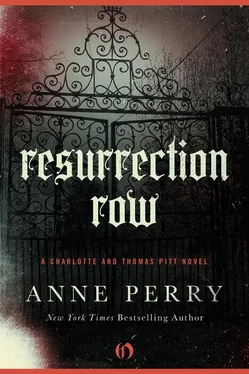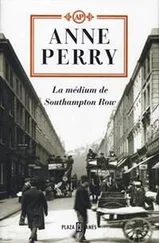Anne Perry - Resurrection Row
Здесь есть возможность читать онлайн «Anne Perry - Resurrection Row» весь текст электронной книги совершенно бесплатно (целиком полную версию без сокращений). В некоторых случаях можно слушать аудио, скачать через торрент в формате fb2 и присутствует краткое содержание. Жанр: Исторический детектив, на английском языке. Описание произведения, (предисловие) а так же отзывы посетителей доступны на портале библиотеки ЛибКат.
- Название:Resurrection Row
- Автор:
- Жанр:
- Год:неизвестен
- ISBN:нет данных
- Рейтинг книги:5 / 5. Голосов: 1
-
Избранное:Добавить в избранное
- Отзывы:
-
Ваша оценка:
- 100
- 1
- 2
- 3
- 4
- 5
Resurrection Row: краткое содержание, описание и аннотация
Предлагаем к чтению аннотацию, описание, краткое содержание или предисловие (зависит от того, что написал сам автор книги «Resurrection Row»). Если вы не нашли необходимую информацию о книге — напишите в комментариях, мы постараемся отыскать её.
Resurrection Row — читать онлайн бесплатно полную книгу (весь текст) целиком
Ниже представлен текст книги, разбитый по страницам. Система сохранения места последней прочитанной страницы, позволяет с удобством читать онлайн бесплатно книгу «Resurrection Row», без необходимости каждый раз заново искать на чём Вы остановились. Поставьте закладку, и сможете в любой момент перейти на страницу, на которой закончили чтение.
Интервал:
Закладка:
4
Pitt did not tell Charlotte about the second grave, nor indeed about the result of the postmortem. She heard about the latter two days later in the early afternoon. She had just finished her housework and put Jemima to bed for her rest when the doorbell rang. The woman who came in three mornings a week to do the heavy work had gone before midday, so Charlotte answered the door herself.
She was startled to see Dominic on the step. At first she could not even find words but stood stupidly, without inviting him in. He looked so little different it was as if memory had come to life. His face was just as she had remembered it, the same dark eyes, the slightly flared nostrils, the same mouth. He stood just as elegantly. The only difference was that it did not tighten her throat anymore. She could see the rest of the street, with its white stone doorsteps and the net twitching along the windows.
“May I come in?” he asked uncomfortably. This time it was he who seemed to have lost his composure.
She recollected herself with a jolt, embarrassed for her clumsiness.
“Of course.” She stepped back. She must look ridiculous. They were old friends who had lived in the same house for years when he had been her brother-in-law. In fact, since he had apparently not remarried, even though Sarah had been dead for nearly five years, he was still a member of the family.
“How are you?” she asked.
He smiled quickly, trying to look comfortable, to bridge the immense gap.
“Very well,” he replied. “And I know you are. I can see, and Thomas told me when I met him the other day. He says you have a daughter!”
“Yes, Jemima. She’s upstairs, asleep.” She remembered that the only fire was in the kitchen. It was too expensive to heat the parlor as well, and anyway, she spent too little time in there for it to matter. She led him down the passage, conscious of the difference between this, with its well-worn furniture and scrubbed board floors, and the house in Cater Street with five servants. At least the kitchen was warm and clean. Thank goodness she had blackened the stove only yesterday, and the table was almost white. She would not apologize; not so much for herself as for Pitt.
She took his coat and hung it behind the door, then offered him Pitt’s chair. He sat down. She knew he had come for some reason, and he would tell her what it was when he had found the words. It was early for tea, but he was probably cold, and she could think of nothing else to offer.
“Thank you,” he accepted quickly. She did not notice his eyes going round the room, seeing how bare it was, how every article was old and loved, polished by owner after owner, and mended where use had worn it down.
He knew her too well to play with gentilities. He could remember her sneaking the newspaper from the butler’s pantry when her father would not allow her to read it. He had always treated her as a friend, a strong friend, rather than as a woman. It was one of the things that used to hurt.
“Did Thomas tell you about the grave robbing?” he asked suddenly and baldly.
She was filling the kettle at the sink. “Yes.” She kept her voice level.
“Did he tell you much?” he went on. “That it was a man called Lord Augustus Fitzroy-Hammond, and that they dug him up twice and left him where he was bound to be found quickly-the second time in his own pew in church, where it would be his family who saw him?”
“Yes, he told me.” She turned off the tap and set the kettle on the stove. She could not think what to offer him to eat at this time of day. He was bound to have lunched, and it was far too early for afternoon tea. She had nothing elegant. In the end she settled for biscuits she had made, sharp, with a little ginger in them.
He was looking at her, his eyes following her round the room, anxious. “They did a postmortem. Thomas insisted on it, even though I begged him not to-”
“Why?” She met his eyes and tried to keep all guile out of her face. She knew he had come for some kind of help, but she could not give it if she did not understand the truth, or at least as much of it as he knew himself.
“Why?” He repeated her question as if he found it strange.
“Yes.” She sat down opposite him at the scrubbed table. “Why do you mind if they do a postmortem?”
He realized he had not told her about his connection with the family and assumed that that was why she was confused. She could see the thoughts crossing his mind and was surprised how easily she read them. In Cater Street he had seemed mysterious, private, and out of reach.
She allowed the mistake.
“Oh,” he acknowledged his omission. “I forgot to explain-I know Lady Alicia Fitzroy-Hammond, the widow. I met her at a ball some little time ago; we became-” He hesitated, and she knew he was debating whether to tell her the truth or not; not from any sensitivity to old feelings, because he had never been aware of them, but from a habitual delicacy in discussing such things. One did not speak freely of a relationship with a recent widow, still less of another man’s wife. Personal emotion of any sort was hinted at, rather than named.
She smiled very slightly, allowing him to flounder.
He met her eyes, and memory was too strong for him. “-friends,” he finished. “In fact, I hope to marry her-when a decent time has passed.”
She was glad she had been prepared for it; somehow it would have been a shock if it had come without any warning. Was her resentment for Sarah’s memory, or for her own, a final shedding of girlhood dreams?
She forced her mind back to the disinterment. “Then why do you mind there being a postmortem?” she asked frankly. “Are you afraid it will uncover something wrong?”
His face colored, but he remained looking at her fixedly. “No, of course not! It is the suspicion! If the police demand a postmortem, that means they must have a strong belief there is something to discover. In any event, they were wrong.”
She was surprised. Pitt had not told her it had been done. “You mean it is over?” she asked.
His eyebrows went up. “Yes. You didn’t know?”
“No. What did they find?”
He looked angry and unhappy. “They made it worse than before. It made their suspicions obvious, without proving anything. Alicia consented to it because Thomas told her it would put an end to all the speculation. But the answer was equivocal. It could have been natural heart failure, or it could have been an overdose of digitalis. And an overdose could have been accidental-his mother keeps it for her heart-or it could have been murder.”
Of course she knew he would say this, but now that he had, she did not know how to answer. She asked the obvious question.
“Is there any reason to suppose it was murder?”
“The damned corpse was dug up twice!” he said furiously, his helplessness breaking through in anger. “That isn’t exactly common, you know! Especially in that sort of society. Good God, Charlotte, have you forgotten what suspicion of murder did to us in Cater Street?”
“It stripped off the facade, so we saw all the weak and ugly things we had learned to hide from ourselves and each other,” she said quietly. “What are you afraid you will see here?”
He stared at her, something close to dislike in his face. She would have expected it to hurt her, and yet it did not, not closely, inside herself where real pain lived; rather, it was the distant ache one feels for someone unknown, whose misfortune one has seen before and known to expect.
“I’m sorry.” She meant it, not as an apology but as an expression of regret, even sympathy. “I really am sorry, but I don’t know of anything I can say or do to help.”
His anger vanished. He was caught; he knew all the disillusion, the malice, and the fear that almost inevitably would follow, and he was afraid.
Читать дальшеИнтервал:
Закладка:
Похожие книги на «Resurrection Row»
Представляем Вашему вниманию похожие книги на «Resurrection Row» списком для выбора. Мы отобрали схожую по названию и смыслу литературу в надежде предоставить читателям больше вариантов отыскать новые, интересные, ещё непрочитанные произведения.
Обсуждение, отзывы о книге «Resurrection Row» и просто собственные мнения читателей. Оставьте ваши комментарии, напишите, что Вы думаете о произведении, его смысле или главных героях. Укажите что конкретно понравилось, а что нет, и почему Вы так считаете.












